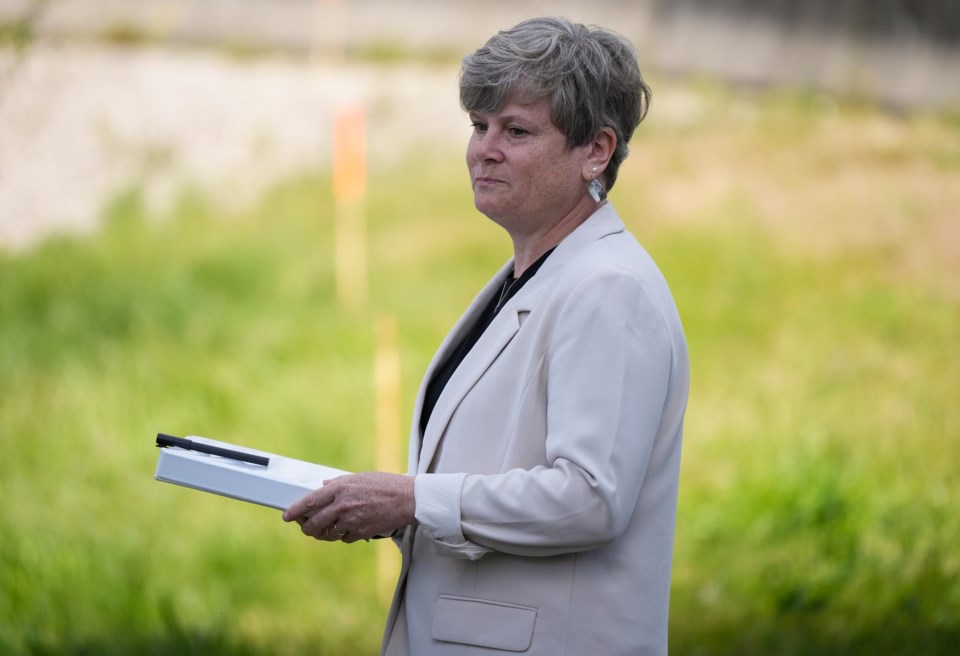VICTORIA — British Columbia Health Minister Josie Osborne is "sincerely apologizing" to the family of a 10-year-old girl on Vancouver Island with a rare disease after a public fight over the province's decision to cut off funding for her medication.
Osborne issued the public apology at a news conference on Friday after her government announced it would restore medication funding for Charleigh Pollock, the only person in B.C. with Batten Disease.
The minister she had also spoke with Pollock's mother Jori Fales late Thursday to express the regret she felt.
"I apologized for the pain and the suffering that they've been through as part of this," Osborne said.
The province cut off funding last month for the drug Brineura — which costs about $1 million per year — citing an expert committee, which said the medication was no longer helping to slow the progress of the girl's disease.
No cure exists for the rare neurodegenerative disorder that causes seizures, blindness and declining motor functions.
Osborne personally called Foles to tell her that government would restore funding, citing another group of U.S.-based experts, who had released a letter dated July 16.
Those experts "strongly" opposed the decision to withdraw funding for the medication and called for a review of the criteria that had guided B.C.'s decision to cut off the funding.
Osborne said the girl should not be suffering because of the "significant disagreement" among experts.
Fales celebrated in a video posted on social media, saying the "nightmare is over," adding she is "beyond grateful" to supporters who backed her cause to have the funding restored.
The celebration is a reversal from her reaction on July 11 after another committee of experts confirmed the initial decision to discontinue funding the drug.
Fales posted a video on social media sobbing, saying she was "disgusted" and "heartbroken" by the decision.
The government later confirmed that Pollock was the only Canadian child with the disease, whose medication was not publicly funded.
After the funding was cut, a campaign to privately purchase a dose of Brineura was launched amid criticism from various corners of the political spectrum, including Conservative Party of B.C. Leader John Rustad, who accused government of creating what he called "GoFundMe health-care."
Former NDP staffer and current Port Coquitlam Mayor Brad West also criticized government last week.
"Isn't one of the fundamental roles of elected government to offset the cold, cruel indifference of bureaucracy? Shouldn't our elected officials be the ones who humanize the system?" he asked on social media. "Especially from a party that claims the mantle of compassion. Otherwise what's the point."
When asked about the criticism, Osborne said she "absolutely" understood the frustration that B.C. residents have expressed about the girl's case.
"I share a lot of that myself," she said. "I also have seen the massive outpouring of support for Charleigh and for her family, which is evidence that British Columbians care, and they care deeply," she said.
She added that people want decisions about care to be made by health professionals and medical experts.
"But I also know that British Columbians never want to see a child like Charlie suffer … or be put in the middle of that," Osborne said.
Situations like Pollock's highlight what the minister said is "the urgent need for stronger, more transparent processes," particularly around Brineura.
Osborne said she has asked the Therapeutics Initiative — an independent body based at the University of B.C. — to conduct a thorough, evidence-based review of Brineura.
She said she urged BioMarin Pharmaceuticals, the pharmaceutical company that manufactures Brineura, to promptly request a formal review by the Canadian Drug Agency of the current reimbursement criteria.
Osborne also called on Ottawa to "urgently expedite" implementation of the National Strategy for Drugs for Rare Diseases that would allow for a consistent national approach that would ensure access for all provinces and territories.
Brennan Day, Conservative MLA and Opposition critic for rural and seniors health, welcomed the government's reversal in a statement.
Day called the decision a "victory for Charleigh, her family, and every British Columbian who stood up and demanded better" but questioned the process that led to it.
“The government made the right call, but only after being pushed to the brink by public outrage and media scrutiny," Day said.
He added that the decision shows a "deeply broken" system that "only responds when headlines get loud enough, and families go public."
This report by The Canadian Press was first published July 18, 2025.
Wolfgang Depner, The Canadian Press




